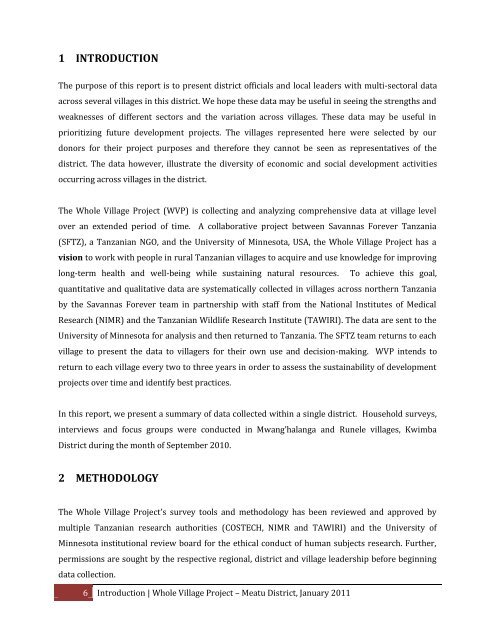Meatu District Report - Whole Village Project - University of Minnesota
Meatu District Report - Whole Village Project - University of Minnesota
Meatu District Report - Whole Village Project - University of Minnesota
Create successful ePaper yourself
Turn your PDF publications into a flip-book with our unique Google optimized e-Paper software.
1 INTRODUCTION<br />
The purpose <strong>of</strong> this report is to present district <strong>of</strong>ficials and local leaders with multi-sectoral data<br />
across several villages in this district. We hope these data may be useful in seeing the strengths and<br />
weaknesses <strong>of</strong> different sectors and the variation across villages. These data may be useful in<br />
prioritizing future development projects. The villages represented here were selected by our<br />
donors for their project purposes and therefore they cannot be seen as representatives <strong>of</strong> the<br />
district. The data however, illustrate the diversity <strong>of</strong> economic and social development activities<br />
occurring across villages in the district.<br />
The <strong>Whole</strong> <strong>Village</strong> <strong>Project</strong> (WVP) is collecting and analyzing comprehensive data at village level<br />
over an extended period <strong>of</strong> time. A collaborative project between Savannas Forever Tanzania<br />
(SFTZ), a Tanzanian NGO, and the <strong>University</strong> <strong>of</strong> <strong>Minnesota</strong>, USA, the <strong>Whole</strong> <strong>Village</strong> <strong>Project</strong> has a<br />
vision to work with people in rural Tanzanian villages to acquire and use knowledge for improving<br />
long-term health and well-being while sustaining natural resources. To achieve this goal,<br />
quantitative and qualitative data are systematically collected in villages across northern Tanzania<br />
by the Savannas Forever team in partnership with staff from the National Institutes <strong>of</strong> Medical<br />
Research (NIMR) and the Tanzanian Wildlife Research Institute (TAWIRI). The data are sent to the<br />
<strong>University</strong> <strong>of</strong> <strong>Minnesota</strong> for analysis and then returned to Tanzania. The SFTZ team returns to each<br />
village to present the data to villagers for their own use and decision-making. WVP intends to<br />
return to each village every two to three years in order to assess the sustainability <strong>of</strong> development<br />
projects over time and identify best practices.<br />
In this report, we present a summary <strong>of</strong> data collected within a single district. Household surveys,<br />
interviews and focus groups were conducted in Mwang’halanga and Runele villages, Kwimba<br />
<strong>District</strong> during the month <strong>of</strong> September 2010.<br />
2 METHODOLOGY<br />
The <strong>Whole</strong> <strong>Village</strong> <strong>Project</strong>’s survey tools and methodology has been reviewed and approved by<br />
multiple Tanzanian research authorities (COSTECH, NIMR and TAWIRI) and the <strong>University</strong> <strong>of</strong><br />
<strong>Minnesota</strong> institutional review board for the ethical conduct <strong>of</strong> human subjects research. Further,<br />
permissions are sought by the respective regional, district and village leadership before beginning<br />
data collection.<br />
6 Introduction | <strong>Whole</strong> <strong>Village</strong> <strong>Project</strong> – <strong>Meatu</strong> <strong>District</strong>, January 2011



